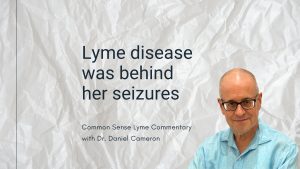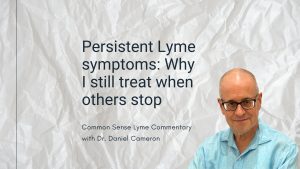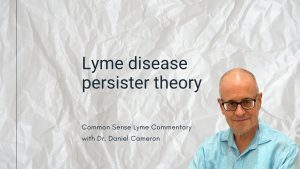Call for your appointment today 914-666-4665 | Mt. Kisco, New York

The authors compared 16 individuals with Lyme disease receiving TNF-α inhibitors with 32 healthy controls to understand whether suppressing their immunity is harmful. The individuals had confirmed Lyme disease with an erythema migrans rash manifestation. The patients received immune-suppressing medications, which included adalimumab, infliximab, etanercept, golimumab. These were often combined with other immunosuppressant drugs for rheumatic (13 patients) or inflammatory bowel (3 patients) disease.
Investigators found that, when compared to controls, patients receiving immunosuppressants had:
- frequent comorbidities other than immune-mediated diseases (62.5% vs. 25%)
- symptoms/signs of disseminated Lyme borreliosis (18.8% vs. 0%)
- treatment failure (25% vs. 0%.)
In fact, 4 out of 16 (25%) Lyme disease patients treated with immunosuppression therapy failed treatment. Three of these four patients required retreatment. One of them was quite ill.
“The immunocompromised patients were also more likely to fail treatment than patients who were not immunocompromised,” writes Maraspin.
The fourth patient, a 44-year-old man, remained well until his 6-month follow-up visit. But, “7 months after beginning antibiotic treatment he developed severe arthralgia, fatigue and back pain,” writes Maraspin in the Journal of Clinical Medicine.
[bctt tweet=”25% of Lyme disease patients treated with immunosuppression therapy required re-treatment for Lyme disease, according to study findings. ” username=”DrDanielCameron”]
A specialist was consulted but could not confirm whether the man had a relapse of rheumatoid arthritis. He remained ill for the next 5 months. And tests revealed his IgG antibody to VlsE borrelial antigens rose from 542.1 to 1462.0 AU/mL.
His symptoms improved following re-treatment with the antibiotic, ceftriaxone.
The authors recommended regular follow-up visits understand whether suppressing immunity harmful to Lyme disease patients?
Related Articles:
Persistent Lyme infection or inflammatory immune response?
References:
- Vera Maraspin, Petra Bogovič, Tereza Rojko, et al. Early Lyme Borreliosis in Patients Treated with Tumour Necrosis Factor-Alfa Inhibitors. J Clin Med. 2019 Nov; 8(11): 1857.




As far as I am concerned a misdiagnoses of Chrohn’s disease which was totally wrong and the introduction of IV steroids with follow up 60mg. prednisone for months and months is what ruined my life. By suppressing my immune system my neurological lyme got so severe that the following occurred. Difficulty breathing, difficulty swallowing, increased myoclonus(jerking of limbs involuntarily), felt like I was going to have a full blown seizure, tinnitus got much worse. If I could have found an open window in that hospital I would have jumped! After refusing feeding tubes because they had no idea what the hell was wrong with me I pleaded with my wife to get me a hospital bed at home and that’s where I lay for 2 years.
After leaving the hospital my bowel motility shut down for 12 days, muscle twitching increased dramatically, severe headaches. Upon flouroscopy, laprascopic abdominal surgery it was determined there was no Chrohn’s disease. The great imitator hit me hard. Thankfully a gastroenterologist determined that I just had a severe irritable bowel more than likely from nerves irritated to the bowel from Lyme. He weaned me off steroids slowly but it had done its damage to me. I don’t know about other Lyme patients but after what I have been through from 1993 to this day I would stay away from anything that lowered my immune system.
I was diagnosed with MS. Took immunosuppressants for two years before stopping against Dr advice. I went downhill so fast I knew there was something else happening. Three more years passed before I got an out of country Lyme diagnosis. Sadly my neurologist could have this study in his hands and would have still told me I need to keep on his immunosuppressant treatment plan.
My daughter who had Lyme was prescribed prednisone because she always had swollen glands and a sore throat. (chronic EBV) The next twelve years were hell for her and then she died.
We need more research in this area. I shared the finding in this Blog to encourage more research.
How should someone treat something like lupus?
The treatment often consists of medications to suppress the immune system. There are a growing number of treatments available to rheumatologist. Lupus can be difficult to diagnosis in some patients. I have had some patients where treatment for Lyme disease has been helpful.
In a chronic Lyme/TBD patient diagnosed with autoimmune disease (Lupus, Sjogren’s, etc) where both diseases need treatment concurrently how do you balance the need for DMARDS like methotrexate (and possibly anti TNF meds)
There are treatments to suppress the immune system. Rheumatologists have a growing number of choices.
It’s challenging to find a rheumatologist that believes in chronic TBD’s
I was in remission for 24 years after being treated for 14 months of Iv antibiotics. I had an occasional flare-up which I treated with natural immune supporters and diet. Last year I went to the hospital for chest pains and they gave me Pregnesone an I’ve been sick ever since. I have Uticaria welts all over my body with itching and pain. I have bouts where I can’t breathe. The first thing they want to do is put me back on Prednisone and that’s what caused me to go out of remission!
I’ve got knee pain so bad now I can’t walk, confusion, dizziness, chest pain and irregular heartbeat, and excruciating headaches
It’s exactly the same symptoms I had when I first got bit… Never never take this stuff if you have Lymes!
I have developed joint pain and stiffness suddenly over last 3 to weeks. My docs say polymyalgia rheumatica. Hands, fingers, knees, feet. Ive had tick butes bur no rash. Rt eye droop at times. I take remicade, for pyoderma, actemra fot giant cell and methotrxate. Would you recommend lyme test and do drugs affect results?
Polymyalgia Rheumatica and Lyme disease look alike. I typically look a second time at a tick borne illness even if my patients respond to steroids.
I am presenting with signs of Lyme after a tick bite in June. No rash and IGG/IGM test was negative. Is it possible that I have Lyme?
The tests are not as reliable as I would like. I have to look for other illnesses if the IgG/IgM are negative. I also look for evidence of co-infections. Lastly, I often have to use clinical judgment if the tests are negative and I can’t find another answer.